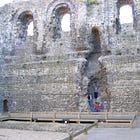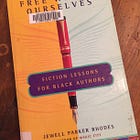photo: Alison Acheson
Bryce Canyon, Utah, summer 2018, on a road trip with my sonThis piece was the germ of ‘vision’ for The Unschool. And as such, sums some of what we’ll be looking at, and how I approach being an autodidact.
Why this photo? This is how it feels, too often, learning to write, being a writer. Grasping for foothold, growing roots as reality begs of us. But growing. Long enough to be old. And be what we are. A tree. A writer. And a view of the world of which we write, Out There.
I had been writing seriously (almost daily) for just over a decade when I entered an MFA (Master of Fine Arts) program. For me, it was like the ski lessons after I’d learned how to fall in the snow, and do the snow plow, and — most important — how to stop. With the ‘ski lessons’ within a program, I took off.
In the aftermath, though, I also realized the role of self-education and to re-frame a few things. You are never off the hook for your own learning. No one can do it for you.
Now it has been years — another ‘more than a decade’ — that I have taught within an MFA program. I wrestle with what I’ve come to know about this path—the choice of spending two years in an institution—and its reality and usefulness.
Here’s a secret: I’ve known too many people to go through an MFA writing program, emerge on the other side, and… not write. Or not publish. And what is all that about? What are the tools you need, and what do you already have in hand… and how can you use that?
What does it take to be a writer? Or ‘one who writes’?
Each writer’s path is unique. Mine started in grade two, when I thought that the only thing better than reading could be the other side, the storytelling. At sixteen, I became a drop-out hairdresser and left home. Two years later, because I had a really bad writing-itch, I ended up in a community center night school class, taught by an aging British woman who claimed to be a “cultural missionary” to Canada. (Wow. That would not happen now... I hope.)
I was the youngest in that class by at least fifteen years. Everyone was so kind… is what I remember most about those Monday nights. I was unutterably broke at the time — all my earnings went to rent. Attending the $30 classes meant trimming off my food budget, and I would walk an hour each way to get there. But I was learning, and the walk home always felt much shorter.
And I was reading. In and out of the library with an armload, just as my child-self did weekly.
Thoughts
My twenty months in the MFA program gave me a reason to take myself seriously; that is probably the most it did for me. And my thesis advisor recommended my short fiction collection to an editor she knew, and he chose to publish it. That was a noteworthy bonus, yes.
But the program was expensive, and there are questions I’m left with as a teacher. I’m not convinced that a program is the best place to develop as a writer.
In Dorothea Brande’s book, Becoming a Writer (first published in the 1930s, and frequently brought back into print for good reason), she talks about the necessity of understanding the roles of both writer and editor in your self. Add “teacher” to that, and develop that part of your self, too, I’m going to suggest, and think of your self as an apprentice. It will put you in learning mode.
Don DeLillo spent his 20s and into his 30s reading. Reading is key. He wrote, and did not publish his first book until age 35. Stephen King says to “read as much as you write.” You can’t learn and grow as a writer if you don’t read.
Some writers, especially emerging writers, have concerns about reading, concerns that they will somehow take on other writers’ voices, and not develop their own. But in every other art form, practitioners learn by imitation, and there’s no reason to eschew that learning mode for the literary form.
Try on voices; in the act of this trying, you will learn to hear your own in the cacophony. And if you do resist reading fiction when you are writing it, then read nonfiction — which, same as any other form, requires rhythm that you will learn to hear. And read poetry, for the magic of language and metaphor. If you write nonfiction, then read fiction for its elements of character and setting. Read drama so you understand the difference between showing and telling, and also for detail…
READ. And keep a reading journal of everything you read — just a few quick notes. But do it.
Keep a day-to-day journal
You may think your day-to-day existence is boring, but as you live each day, you are growing, changing in imperceptible ways, too nuanced to even notice at the time… until months have passed. This metamorphosis can only be captured day by day. So keep a journal so that you have material for the rest of your life. (My memoir, Dance Me to the End: 10 Months and 10 Days with ALS, came from a 600 page journal kept daily through my months of caregiving. I could not have written the memoir without it, even though there is not one sentence shared between the two.)
Be involved
At least, be aware! Of life around you.
In a 2005 interview, DeLillo says that, “Writers must oppose systems. It’s important to write against power, corporations, the state, and the whole system of consumption and of debilitating entertainments […] I think writers, by nature, must oppose things, oppose whatever power tries to impose on us.”
While you do not have to be actively placing “today” in your work, if you are not consciously living in your immediate world, ask yourself why? I suggest you mull it over, as living in your world — our world — with awareness will — again — give you a lifetime of material no matter what you write. It is your response to the world and how it moves you, that will feed your writer self and habit.
Reading about writing
This is different from reading within the genres that interest you. I’m going to suggest you buy — yes, own — some great words on writing, so that you can scribble thoughts in them, highlight, and nibble the corners and ingest! Also invest in good grammar books, (including the works of Karen Elizabeth Gordon—with wood-cut illustration and witty examples! Not just any punctuation book can have you laughing).
And remember to support other writers as you learn. Make connections between what you read in these books or online pieces about writing, with what you are reading.
Example: read my piece about punctuating dialogue (something almost every MFA student struggles with) and then, when reading a novel, see what I’m talking about. Apply to your own work.
Follow the needs of your story
Those are your needs as a writer, too. This is not a quick path. Taking part in a program cannot do the work for you. That idea of 10,000 hours to become good at what you have chosen to do—it’s not far off! And then follow the needs of your next story.
Retain your childhood sense of Wonder
In his Caldecott Award acceptance speech, William Steig said that, “Wonder is respect for life.” I’m convinced that the most useful measuring tool of my work is this: at the conclusion of first drafts, I ask, “Where is the wonder?” Wonder will carry you through rejection and tough and dry times, too.
On dreaming
Rita Mae Brown, in her writers’ “survival manual,” as she calls it, has some wonderful advice.
“Never dream more than you write.”
A most excellent quote for when I find myself dreaming and wandering off-path…








Alison: a friend has proposed this: “I think it might be useful for you to submit “Minoru” to one of the reputable markets that will, for a nominal readers’ fee, provide you with a critique.” A reader’s fee I think it is called. Is there someone/place that you might suggest?
Hi Alison, wondering where we can find the annotated bibliography of writing books? I'm really enjoying all the pieces I've read so far, THANK YOU!